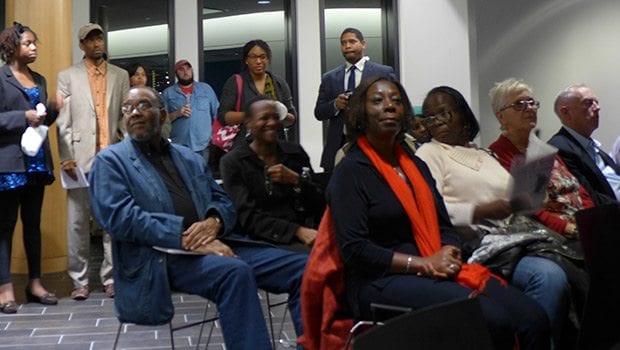
Wadi Muhammad was up until 3 a.m. putting the final touches on a documentary trailer that was five months in the making. For the Roxbury native, it was a project close to the heart: a film that would preserve the stories of his neighborhood that did not make the history books.
With a $2,000 grant from the Grove Hall Trust and a handful of volunteers, Wadi Muhammad launched the Roxbury Legacy Project in July 2015. Working with his team, he set out to collect photos and record accounts of some of the families who have helped shape the community for generations.
Last Wednesday, the sixth floor of the Bolling Building was filled with these families. They mingled and examined photo displays, before sitting down to slam poetry, speakers and the trailer’s unveiling.
In the 14-minute film, voices of residents recalled the tumultuous ’60s and ’70s in Roxbury, their love of the community and their dreams for its future.
Immortalized history
Roxbury has been long heralded as the “Mecca of the black community.” But as gentrification increases, some long-term residents fear that identity and history will disappear.
“It’s a mecca but we’re losing something. If Roxbury’s the Mecca there needs to be a mark,” said Reverend Michael Haynes in the film. Haynes is pastor of the 12th Baptist Church, the church where he came to know Martin Luther King, Jr.
Wadi Muhammad says his documentary is a step along the way to keeping the community’s history alive.
Spreading the stories
The project seeks to remind new residents that Roxbury means more than just a zip code or short commute time and bring them into the community’s narrative and rich culture.
“Part of goal is to educate new folks coming in, to bridge the gap and make community,” said Wadi Muhammad.
On the Web
View Roxbury Legacy Project’s trailer: https://www.youtube.com/watch?v=oP_PFXBhUVU
Newcomers may be familiar with prominent historical figures like Louis Farrakhan, Martin Luther King, Jr. and Malcolm X, but not the stories of families who have been important in the community for generations.
“Everyone knows MLK and Farrakhan, but not other individuals and families who helped stabilize the neighborhood after riots and urban renewal,” he said. “You don’t know about the Sister Virginias, the Hyman family, the Haynes.”
Interviewees include members of the Janey family of Janey Construction. The family is a fixture: They have owned the same home on Townsend Street for over seven decades and three generations of Janeys have been leaders in one of the oldest black churches in the community, said Wadi Muhammad.
Another interviewee is Sylvalia “Val” Hyman III, member of the board of directors for the antipoverty agency Action for Boston Community Development as well as Tent City Corporation, a land trust focused on combating homelessness and preserving neighborhoods. (“The guy’s been on every single board in Roxbury,” said Wadi Muhammad).
History was not restricted to reflections on the past; it was being made through the creation of the film as well. Denine Wilson, one of the documentary’s photographers and Wadi Muhammad’s cousin, comes from Cambridge. At first, she said, she had no context for the locations and buildings she was photographing, but learned about them from listening to the interviews.
“I’m looking forward to keeping in touch with the Roxbury community,” she said.
Guiding the future
Alongside celebrating the work of residents to shape their community, the event also called for a reaffirmation of that drive and involvement going forward.
Sydney Janey runs a design company in Roxbury and hails from the family running Janey Construction. She told event attendees that participating in community meetings about land development was a powerful way to have a say in Roxbury’s future.
The legacy of Roxbury also rests on its children, said several speakers, and in the youths’ active participation.
“I want my children to know we contributed and they must contribute,” said Sister Virginia Morrison, executive director of Neighborhood Development Corporation of Grove Hall. “We do live in a village and we have a responsibility.”
In many families, children have built on their parents’ commitment and contribution to the community. Latifa Ali is the founder of Circle the City, an open streets festival. She said she was inspired by her mother Jacqueline Muhammad, who launched an arts and culture festival in the 1980s.
Wadi Muhammad said he hoped to encourage people to leave their own legacies.
“Everyone in this room has a legacy, a story to tell,” he said.
Future filming
The Roxbury Legacy Project has far more footage than was possible to include in the trailer. Wadi Muhammad said he hopes to produce a full-length documentary, continue collecting stories and find ways to make them accessible to those interested in Roxbury’s history.
The next step is to meet with documentary and community stakeholders. Ideas under discussion include making materials available through event screenings or as part of Boston Public Library’s digital archives, along with working with youths from Press Pass TV to gather more stories and turn the materials into documentaries.
Lasting landmark
The second goal of the Legacy Project is to draw attention to Grove Hall Main Street’s Heritage Trail and efforts to immortalize Roxbury history in the form of physical landmarks in the neighborhood, said Wadi Muhammad.
Landmarks could take the form of plaques identifying where Malcolm X grew up or other historical events. The naming of a building also can be key to preserving memories of notable figures for the next generation.
“If you have the opportunity to name a building, name it after your family, so kids who walk down the street can say, ‘That’s a black person,’ and it builds a sense of pride,” Sister Virginia said.
Sister Virginia worked with Robert Hector on creating a memory trail from Grove Hall to Dudley Square. She said they plan to create a digital app that would provide audio narration on the history of neighborhood sites as people walk by them.






